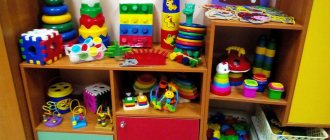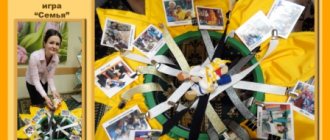Methodological work based on diagnostics
To optimize the management of preschool educational institutions, it is necessary to increase the efficiency of methodological work with teachers. When this type of work is based on diagnostics, it becomes possible to optimize the pedagogical process, since such a basis involves a detailed study of the needs of both children and parents, the capabilities of each teacher and the entire team, and this makes it possible to determine the most effective set of forms, techniques and methods of methodological work, which improve pedagogical skills, professional qualifications, and stimulate the creativity of teachers.
A low level of quality of education may have several reasons: shortcomings in the training of educators, lack of interaction with parents, an outdated education program, methods and technologies for working with children, or an unsystematic set of innovations, etc. Main direction
methodological work is to identify these reasons, provide consultations and specific recommendations to educators, and develop a plan for the implementation of improving the quality of educational services of preschool educational institutions.
When studying the pedagogical activity of a teacher, it is necessary to evaluate his ability to organize and conduct various types of children’s activities (work, play, art and theater), the ability to develop speech, qualities and skills for communicating with preschoolers.
Advanced training
educators are provided with information about scientific and theoretical knowledge. The educator must understand that the teacher’s diagnosis is a theoretical foundation for the implementation of practical activities. Diagnosis of the development of preschoolers should be subject to correction by the methodologist, and the teacher should have an idea of \u200b\u200bthe diagnosis of the pedagogical process. The creativity and freedom of educators should be both encouraged and corrected.
Modern educators must master methods of psychological and pedagogical diagnostics of development, studying the pedagogical culture of parents, self-diagnosis of their professional and psychological activities; skills to assess the conditions in which preschoolers live.
Legislation in the field of preschool education and monitoring
In 2013, the Law “On Education” was adopted. The document emphasized the obligation to conduct monitoring and place the obtained data in the public domain. A definition of the procedure itself is given: systematic monitoring of the education sector according to developed criteria. The assessment parameters included: the dynamics of educational results and the population, learning conditions, educational achievements.
You may be interested in: Two conditions for the equilibrium of bodies in physics. An example of solving an equilibrium problem
Preschool education also had to join this process. However, the introduction of the federal standard made some adjustments. The procedure for monitoring preschool education according to the Federal State Educational Standard is presented somewhat contradictorily. On the one hand, it is noted that educational targets should not be directly assessed. On the other hand, a procedure for pedagogical monitoring is provided. As a result, the objects of assessment were the educational process and the conditions created by the teaching staff to achieve the requirements of the standard.
You may be interested in: Ancient races: theories of human prehistory, names of races and causes of death
Assessment of the developmental and material environment
The modern educational process is impossible in the absence of the necessary technical means. During monitoring of preschool education, special attention is paid to this.
The financial capabilities of the institution are assessed by the head. Incoming funds, needs and expenses are taken into account. Monitoring is carried out continuously throughout the year.
Material and technical conditions are analyzed by deputy heads or senior educators. Their compliance with specified standards is assessed, and the need for the purchase of new equipment is identified.
Monitoring of the subject-development environment is carried out by all teaching staff. The features of the developmental environment in groups and the surrounding area are taken into account. Methods: self-control, competitions, mutual control, questioning. Based on the results, analytical reports are compiled.
Parents' opinion
An important indicator of the quality of the educational process in kindergarten remains the opinion of the families of pupils and their satisfaction with the services provided. Therefore, the traditional form of monitoring preschool education is conducting surveys and questionnaires to assess the position of parents. Their results are used when planning work with families of pupils. In most cases, such surveys are anonymous.
Parents are invited to evaluate the work of the kindergarten according to the following criteria:
- teacher qualification level;
- material equipment of the institution;
- dynamics of child development;
- safety of life and health;
- feedback and forms of interaction between employees and parents;
- availability of gaming materials and equipment;
- equipment of the adjacent area;
- methodological support of the educational process.
Source
Monitoring children's progress in the preschool education program
Achieving educational results is the most delicate point in the assessment system. Monitoring of preschool education in this area determines the level of organization of educational activities, achievements and shortcomings in the work of the teaching staff. Planned and carried out by the head of the kindergarten with the participation of all employees.
In the process, we use proprietary methods or develop our own criteria, assessment tools, and comparative scales. Training of employees in assessment techniques may be required. Duration: 2-4 weeks. Based on the results, diagnostic sheets and analytical reports are prepared and available for study.
Who is monitoring?
Considering the number of monitoring parameters, the circle of individuals and organizations involved in it becomes quite extensive. The law mentions external and internal monitoring. The first is carried out by special organizations for assessing the quality of education, the second is carried out by educational institutions themselves, based on criteria approved at the federal level. Categories of monitoring participants in the institution: director, educators, specialists, educational psychologists, parents.
Levels of monitoring: federal, regional, local. The assessment can be carried out by regional institutions of further professional education. As part of the monitoring of preschool education, the IED (Institute for Educational Development) provides data on the availability of its services to the population. The results of such research are freely available.
Monitoring of psychological and pedagogical conditions
The success of mastering the basic program largely depends on the atmosphere in which the child finds himself upon entering kindergarten. The standard specifies diagnostic and monitoring criteria in preschool education regarding the conditions for organizing the learning and development process.
The staffing conditions of a preschool institution are assessed by the deputy head or methodologist. Their task is to collect information about specialists, educators, and other employees using the form of account cards and portfolios.
Psychological and pedagogical conditions are analyzed by the administration and teachers of the kindergarten. The emotional atmosphere in groups and the level of professional competence of employees are assessed. For this purpose, methodologists use methods of operational control, educators use mutual assessment, self-analysis, conversations with children, and questioning of parents.
Pedagogical observation
The standard allows for the assessment of a child's individual development. It is carried out with the help of pedagogical monitoring in preschool education. In this case, the actions of educators are assessed first. Each institution has its own system of pedagogical diagnostics, which makes it possible to build the process of individual support for a preschooler. The frequency is determined by the program. The data obtained is used in the work and is not subject to verification by regulatory authorities.
Using recommended methods, the teacher determines the needs, interests, and preferences of children. This makes it possible to adjust your own pedagogical actions. There are direct observations (by the teacher himself), indirect (by other persons), included (the teacher participates in the action), open (children know about it) and closed.
Monitoring functions
Research of this kind is carried out to analyze professional activities, making it possible to improve the pedagogical process. Therefore, the requirements for monitoring preschool education highlight a number of functions:
- Informational. The opportunity to obtain comprehensive information about the quality of the educational process in a particular kindergarten. As a result, participants in educational relations (teachers, governing bodies, parents, representatives of the public) are involved in managing the pedagogical process.
- Control and diagnostic. Monitoring is primarily a tool for assessing the quality of training. Allows you to control the degree of compliance of the educational process with the necessary parameters.
- Reflective. Provides feedback from the educational institution and interested categories of the population. Promotes cooperation between participants in educational relations.
- Integrative. Allows you to objectively assess the educational situation in the city (district), see the full picture, since the monitoring results are analyzed at the internal and external levels.
- Prognostic. It makes it possible to determine the vectors for the further development of the kindergarten and make the necessary amendments.
Basic principles
You will be interested in: History, development and growth rates of the economy of the Russian Empire
Like any standardized system, monitoring the quality of preschool education is built according to certain rules.
Key monitoring principles:




